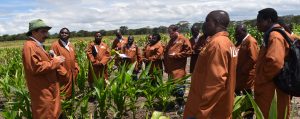Training on MLN Rapid Diagnostic Kits and MLN-Free Seed Production in Kenya
By Dr. Suresh,L.M., Samuel Angwenyi and Francis Mwatuni : Maize Lethal Necrosis (MLN) disease is among the myriad of regional and transboundary threats that continue to render havoc to the integrity of food security in Eastern Africa region since its first detection in 2011 in Kenya. The Eastern African region, especially Kenya, Ethiopia and Tanzanian remain vulnerable to the disease, which calls for strengthening capacity for its management among key stakeholders including maize seed sector players. Following efforts by AATF, AGRA, CIMMYT and other stakeholders in the seed industry to develop harmonized MLN Free Seed Production SOPs in 2016, seed companies have always been encouraged to adhere to the SOPs to curb the losses caused by MLN disease. 
After several follow-up and backstopping missions between 2016, 2017 and 2018 on SOP implementation by seed companies and seed outgrowers in respective countries (Kenya, Uganda, Tanzania, Ethiopia and Rwanda), certain practices were identified which needed separate training sessions to ensure proper execution of the MLN management SOPs. Main focus areas for training included MLN disease scouting, sampling, diagnosis, and seed certification thresholds levels.
To this effect, AATF and AGRA in collaboration with CIMMYT and KEPHIS organized a 2-day intense training session to continue efforts to reinforce specific management options for the disease. The participants, who included Seed Companies, Regulators, NARS and private seed inspectors, were introduced to specific MLN pathogen detection methods: Agristrips and Lamp, and resources available to allow practical use during seed production. Participants conducted hands-on trainings in selected farmer fields on MLN disease scouting, sampling, and testing. The participants also visited the CIMMYT-KALRO MLN Screening site in Naivasha to study more on MLN viruses’ symptoms as well as the breeding advances towards development of MLN tolerant varieties. Dr. Suresh,L.M. have given them complete understanding on how research on MLN disease resistant hybrids are being carried out, also explained various aspects of MLN research. He took all the participants around different activities in MLN screening facility, at Naivasha.
Among other issues discussed in the training included contributions towards harmonizing policies in phytosanitary services that affect seed exchange in the region. The over 60 participants in the training were key seed stakeholders from Kenya, Uganda, Tanzania and Ethiopia.
A follow-up from the meeting, Agra and AATF plan to distribute sample rapid diagnostic kits to seed companies and NARS partners as a way of promoting their use and strengthen internal quality control systems for MLN management. Early detection of MLN disease is key for early control measures, hence, minimize the damage.
